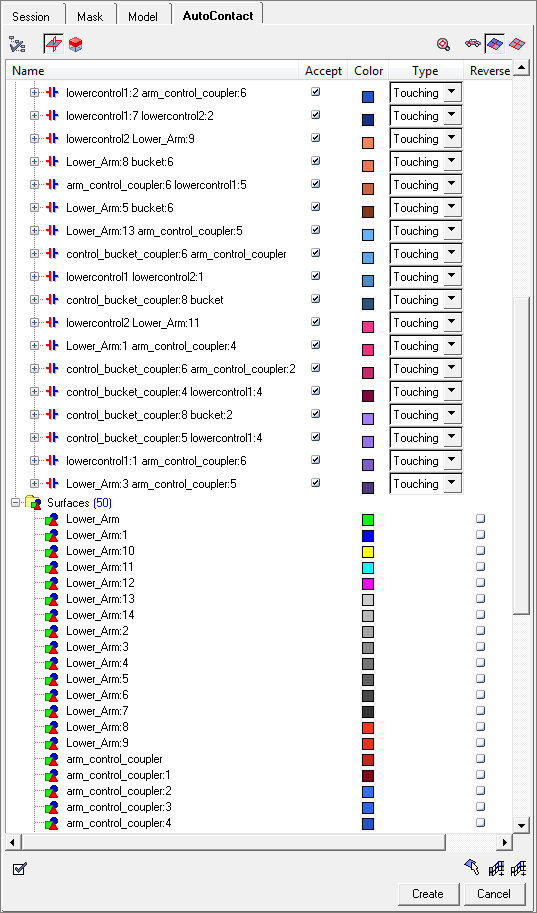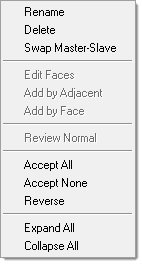Auto Contact Browser |

|

|

|

|
|
Auto Contact Browser |

|

|

|

|
The Auto Contact browser provides options for reviewing and modifying contact interfaces and surfaces that the Auto Contact tool finds. The Auto Contact browser automatically loads in the HyperMesh tab area as part of the Auto Contact creation process. All of the entities listed in this browser are temporary, and are not part of the model until you click the Create button. Clicking Cancel clears all of the temporary entities and closes the Auto Contact browser, leaving your model unchanged. See Remarks below.

The Auto Contact browser contains the following columns:
Column |
Description |
Name |
Lists the names of all of the contact interfaces and surfaces found by the Auto Contact tool. Underneath each contact interface name is the temporary master and slave surfaces associated to that interface. Red indicates a slave surface, and blue indicates a master surface. Renaming entities, as well as Master/Slave surface swapping is possible via the context menu. |
Accept |
This check box defines whether or not a contact interface is included in the creation process once you click Create. |
Color |
Color that is assigned to the contacts and contact surface entities. |
Type |
Type of CONTACT assigned to each contact interface. This affects the IGLUE option for the given BCBODY-BSURF pair inside the BCTABLE card. |
Reverse Normal |
This check box defines whether or not the normal direction of the given surface should be reversed or not. When OFF (default), surfaces on 3D elements point outwards, and surfaces on 2D elements point in the direction of the element normal. |
Right-clicking an item in the Auto Contact browser displays a context menu that offers options for modifying a selected contact interface or surface.

Option |
Description |
||
Rename |
Renames the selected entity. |
||
Delete |
Deletes the selected items from the browser. |
||
Swap Master - Slave |
Allows you to switch the contact surfaces identified as master and slave. When executed, you see the surfaces switch position as master and slave in the browser. |
||
Edit Faces |
Opens the Element Selection panel, where you can manually add and remove individual elements from a selected contact surface. Click Proceed when you are finished.
Also accessible via the Select Elements Manually icon |
||
Add by Adjacent |
Automatically adds all of the immediately adjacent elements to a selected contact surface.
Also accessible via the Add by Adjacent icon |
||
Add by Face |
Automatically adds all of the elements by face to a selected contact surface. The feature angle controlling face detection tolerance can be modified inside the Options dialog
Also accessible via the Add by Face icon |
||
Review Normal |
Allowed only for surfaces containing 2D elements. For surfaces containing 3D element faces, normal direction is automatically assigned in an outward direction. |
||
Accept All/None |
Automatically checks and clears the Accept check box for every item in the Auto Contact browser. |
||
Reverse |
Reverses the Accept check box status for every item in the Auto Contact browser. |
||
Expand/Collapse All |
Automatically expands and collapses every folder in the Auto Contact browser. |
Browser Icons and Other Controls
The Auto Contact browser contains the following icons and controls:
Option |
Description |
||
|
Opens the browser's Options dialog. From this dialog you can enter a new feature angle or customize the transparency for a selected entity. Click OK when you are finished.
|
||
|
When this icon is turned on, the elements that belong to the currently selected contact interfaces or surfaces are highlighted in the graphics area. You can use the Ctrl and Shift keys to select multiple items from the browser. Highlight Elements is mutually exclusive and may be switched off. This could be helpful when working with large models. |
||
|
When this icon is turned on, the elements that belong to the currently selected contact interfaces or surfaces are reviewed in the graphics area. Elements are highlighted by color, while all other components are grayed out. You can use the Ctrl and Shift key to select multiple items in the browser. Review Elements is mutually exclusive and may be switch off. This could be helpful when working with large models. |
||
|
Automatically zooms in on the elements that belong to the currently selected contact interfaces or surfaces. |
||
|
When this icon is turned off (default), the graphics area will dynamically update depending on the entities that are selected in the browser. When turned on, the current display state will remain unchanged, even when you change your selection in the browser. |
||
|
When this icon is turned on (default), the elements belonging to the currently selected contact interfaces or surfaces are highlighted and reviewed in the graphics area, while also displaying the components they belong to. All of the other components are masked and will not display in the graphics area. |
||
|
When this icon is turned on, the elements that belong to the currently selected contact interfaces or surfaces are highlighted and reviewed in the graphics area, while masking everything else. |
||
|
Opens the Element Selection panel, where you can manually add and remove individual elements from a contact surface. Click Proceed when you are finished. Also accessible via the context menu (Right-Click > Edit Faces). |
||
|
Automatically adds all of the immediately adjacent elements to a selected contact surface. Right-click the icon to undo one time. Also accessible via the context menu (Right-Click > Add by Adjacent). |
||
|
Automatically adds all of the elements by face to a selected contact surface. Right-click the icon to undo one time. The feature angle controlling face detection tolerance can be modified inside the Options dialog Also accessible via the context menu (Right-Click > Add by Face). |
||
|
Opens the Auto Contact dialog, so that you can recheck the selected interfaces. When you select interfaces from the browser, the GUI will automatically populate the components that the interaction was based on. This helps modify an existing interface. |
During the Auto Contact process, temporary components may be created for parts containing 3D elements. These temporary components will be named using a preceding ^ symbol, and will automatically contain extracted element faces needed for the contact creation process. Auto Contact will cleanup and remove these temporary components when you finish or cancel the process. If you decide to export the model before accepting or canceling the process, HyperMesh will always exclude these temporary components from export.